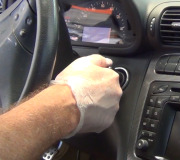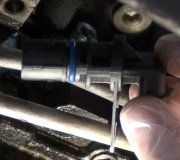Hi and thanks for using 2CarPros.com. Here are the specific directions for you vehicle for removing the battery and replacing:
CONVERSION CALCULATOR
2003 Jaguar X-Type (X400) V6-2.5L
Vehicle � Starting and Charging � Battery � Service and Repair � Battery Disconnecting/Connecting Procedures
BATTERY DISCONNECTING/CONNECTING PROCEDURES
Disconnecting/Connecting The Battery
Always stop the engine before disconnecting the battery negative lead and make sure the battery positive lead is isolated i.e. wrapped in a suitable cloth.
WARNING: Radio code saving devices must not be used when conducting work on air bag or fuel systems. It must be noted that, when using these devices, the vehicle electrical system is still live albeit with a reduced current flow.
NOTE: Before disconnecting the battery make sure that the radio receiver/cassette player/mini disc player and compact disc player keycodes are known and, that no data is required from the powertrain control module as battery disconnection will erase any fault codes and idle/drive values held in the Keep Alive Memory (KAM). It is not necessary to disconnect or remove electronic control modules.
Always disconnect the battery before commencing repair operations which require:
The vehicle to be jacked up
Work on the engine
Work underneath the vehicle
Arc welding
Alternatively a Radio Code Saver may be used. With the battery disconnected, a Radio Code Saver will allow sufficient current to pass to maintain the radio receiver/cassette player/mini disc player and compact disc player memory, operate the clock and supply the door operated interior lights while isolating the battery in the event of a short circuit.
Reconnecting the Battery
WARNING: If the battery has been on bench charge the cells may be giving off explosive hydrogen gas. Avoid creating sparks, and if in doubt cover the vent plugs or covers with a damp cloth.
Always make sure that all electrical systems are switched OFF before reconnecting the battery to avoid causing sparks or damage to sensitive electrical equipment.
Always reconnect the battery positive lead first and the negative last, ensuring that there is a good electrical contact and the battery terminals are secure.
Restart the clock (where fitted) and set it to the correct time.
Re-enter the radio receiver/cassette player/mini disc player and compact disc player keycodes and preset' frequencies, if known.
Following reconnection of the battery, the engine should be allowed to idle until it has reached normal operating temperature as the stored idle and drive values contained within the powertrain control module have been lost. Allow the vehicle to idle for a further three minutes . Drive the vehicle at constant speeds of approximately 48 km/h (30 mph), 64 km/h (40 mph), 80 km/h (50 mph), 96 km/h (60 mph) and 112 km/h (70 mph) for three minutes each. This may cause a driveability concern if the procedure is not carried out. This will allow the powertrain control module to relearn idle values.
Now, if you reviewed these and did what they say, you need to check to see if the engine is getting spark and fuel. Here are general directions for checking both spark and fuel:
https://www.2carpros.com/articles/how-a-crank-shaft-angle-sensor-works
https://www.2carpros.com/articles/how-to-check-fuel-system-pressure-and-regulator
If you find there is no spark, I suspect there may have been damage to the crank sensor or a fuse has blown. I attached directions for replacing a crank sensor with pictures.
Crankshaft Position (CKP) Sensor 18.30.12
Removal
Remove the right-hand front road wheel.
Remove the wheel arch liner access cover.
Disconnect the CKP sensor electrical connector.
Remove the CKP sensor.
Remove and discard the O-ring seal.
Installation
NOTE: Install a new O-ring seal.
To install, reverse the removal procedure.
Tighten to 10 Nm.
Let me know if you have other questions.
Take care,
Joe
Images (Click to make bigger)
Sunday, May 27th, 2018 AT 8:05 PM






